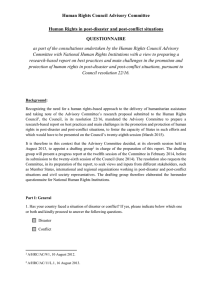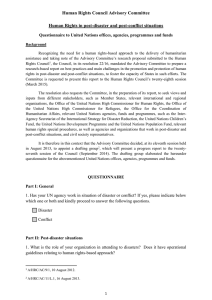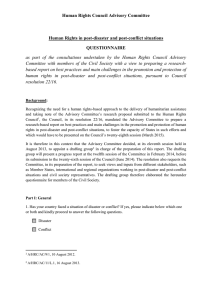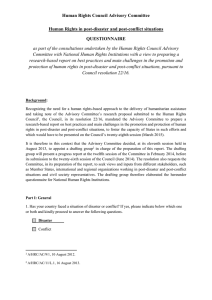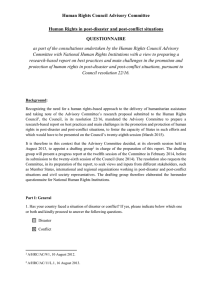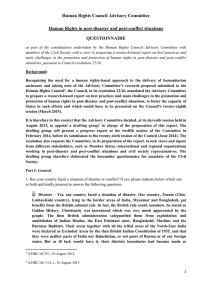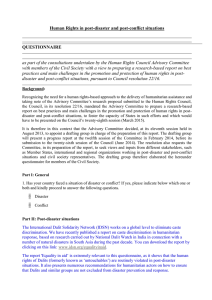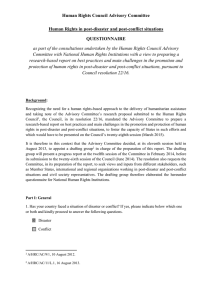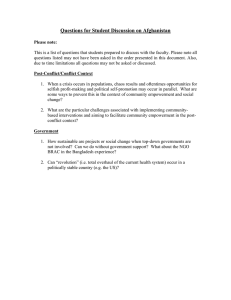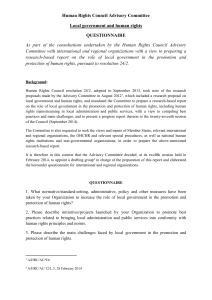Human Rights Council Advisory Committee QUESTIONNAIRE
advertisement
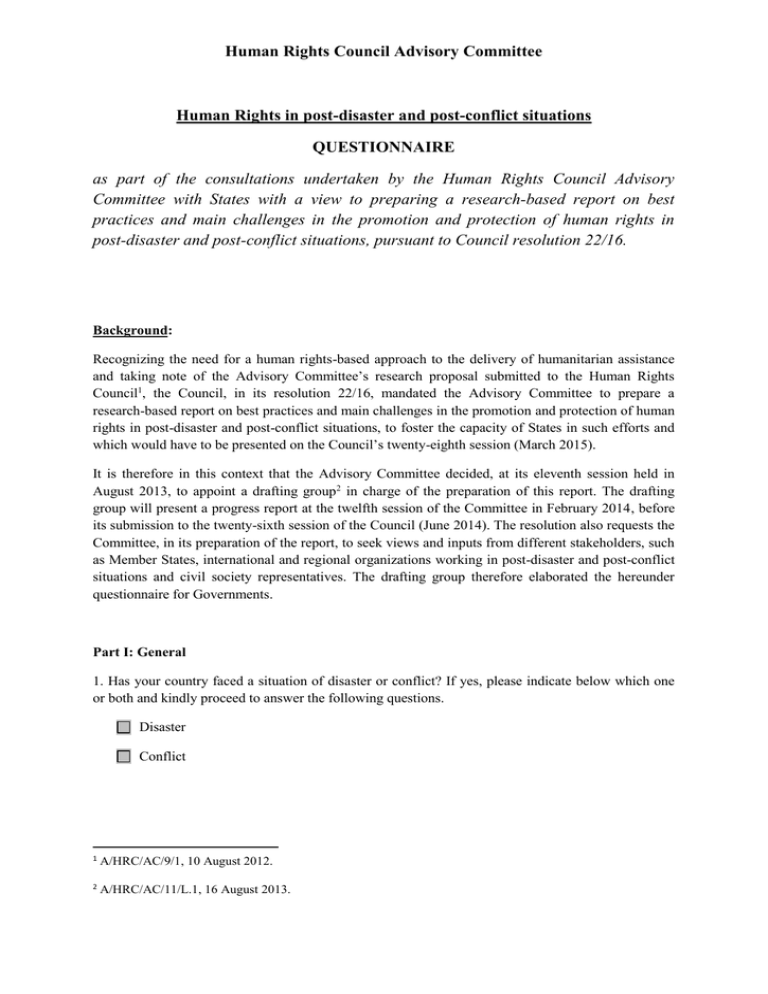
Human Rights Council Advisory Committee Human Rights in post-disaster and post-conflict situations QUESTIONNAIRE as part of the consultations undertaken by the Human Rights Council Advisory Committee with States with a view to preparing a research-based report on best practices and main challenges in the promotion and protection of human rights in post-disaster and post-conflict situations, pursuant to Council resolution 22/16. Background: Recognizing the need for a human rights-based approach to the delivery of humanitarian assistance and taking note of the Advisory Committee’s research proposal submitted to the Human Rights Council1, the Council, in its resolution 22/16, mandated the Advisory Committee to prepare a research-based report on best practices and main challenges in the promotion and protection of human rights in post-disaster and post-conflict situations, to foster the capacity of States in such efforts and which would have to be presented on the Council’s twenty-eighth session (March 2015). It is therefore in this context that the Advisory Committee decided, at its eleventh session held in August 2013, to appoint a drafting group2 in charge of the preparation of this report. The drafting group will present a progress report at the twelfth session of the Committee in February 2014, before its submission to the twenty-sixth session of the Council (June 2014). The resolution also requests the Committee, in its preparation of the report, to seek views and inputs from different stakeholders, such as Member States, international and regional organizations working in post-disaster and post-conflict situations and civil society representatives. The drafting group therefore elaborated the hereunder questionnaire for Governments. Part I: General 1. Has your country faced a situation of disaster or conflict? If yes, please indicate below which one or both and kindly proceed to answer the following questions. Disaster Conflict 1 A/HRC/AC/9/1, 10 August 2012. 2 A/HRC/AC/11/L.1, 16 August 2013. Part II: Post-disaster situations 1. Does your Government have a specific mechanism to deal with disasters? Does it have operational guidelines on a human rights-based approach in such situations? Which human rights do you focus on? 2. How does your Government ensure transparency and accountability in disaster responses and postdisaster recovery (including in connection with food distribution, building and infrastructure reconstruction)? 3. What specific attention, if any, do you give to the needs of the following groups: children, women, indigenous peoples, elderly, persons with disabilities, minorities, non-citizens, including migrant workers? 4. What protections/standards do you have in place to ensure non-discrimination and respect of the humanitarian principles of humanity, neutrality, impartiality and independence in the provision of services, relief, etc.? 5. Please give examples of culturally-relevant/responsive responses and actions, e.g. in terms of food, clothing, etc., and of religiously relevant/responsive responses and actions, including separate facilities for men/women, facilities for worship, clothing, food. 6. What are the main challenges you face in applying protection and promotion of human rights in post-disaster situations? 7. What best practices can you mention in the promotion and protection of human rights in postdisaster situations? 8. What specific measures, if any, do you apply to ensure transparency in the implementation of funds for disaster relief? Part III: Post-conflict situations 1. Does your Government have a specific mechanism to deal with post-conflict situations? Does it have operational guidelines on a human rights-based approach in such situations? Which human rights do you focus on? 2 2. How does your Government ensure transparency and accountability in post-conflict recovery (including in connection with food distribution, building and infrastructure reconstruction)? 3. What specific attention, if any, do you give to the needs of the following groups: children, women, indigenous peoples, elderly, persons with disabilities, minorities, non-citizens, including migrant workers? 4. What protections/standards do you have in place to ensure non-discrimination and respect of the humanitarian principles of humanity, neutrality, impartiality and independence in provision of services, relief, etc.? 5. Please give examples of culturally-relevant/responsive responses and actions, e.g. in terms of food, clothing, etc., and of religiously relevant/responsive responses and actions, including separate facilities for men/women, facilities for worship, clothing and food. 6. What are the main challenges that you face in the promotion and protection of human rights in postconflict situations? 7. What best practices can you mention in the promotion and protection of human rights in postconflict situations? 8. Do you do have a specific mechanism to assure peace building and transitional justice? 9. What are the main challenges you face in peace building and transitional justice? 10. What best practices can you mention on peace building and transitional justice? Deadline for submission of responses to the questionnaire: In order to give the Drafting Group the opportunity to take into account the different contributions, all parties are encouraged to submit their responses as soon as possible and at the latest by 8 November 2013. Answers can be submitted via email to the following address: 3 hrcadvisorycommittee@ohchr.org OR Secretariat of the Human Rights Council Advisory Committee c/o Ms. Dina Rossbacher Office of the United Nations High Commissioner for Human Rights Palais Wilson, Room 4-065, Fax: +41 22 917 9011 United Nations Office at Geneva, CH-1211 Geneva 10, Switzerland Thank you for your contribution. For more information on the Advisory’s mandate: http://www.ohchr.org/EN/HRBodies/HRC/AdvisoryCommittee/Pages/HRCACIndex.aspx 4
